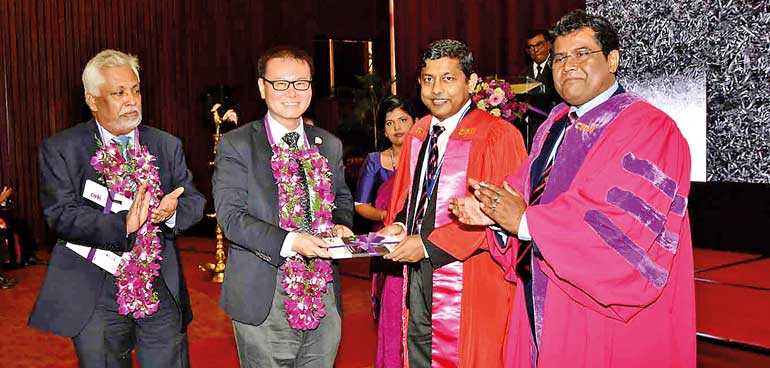Wednesday Feb 18, 2026
Wednesday Feb 18, 2026
Thursday, 18 July 2019 01:33 - - {{hitsCtrl.values.hits}}

Presenting the proceedings of CIPM Research Symposium 2019
The Chartered Institute of Personnel Management (CIPM) Sri Lanka, the nation’s leader in Human Research Management (HRM), successfully concluded its third Research Symposium on the theme of ‘Shifting HRM Paradigms’ on Thursday 11 July at the BMICH, Colombo.
It was a unique opportunity and platform for HR researchers, with the participation of over 200 participants, to present and disseminate the findings of their scientific studies to the HR fraternity. CIPM, Sri Lanka facilitates the conducting and dissemination of research findings related to the HRM practices of the world of work in corporate settings to better understand work-life complexities.
“I am elated to see CIPM, SL hosting the third successive annual research symposium today. CIPM started this initiative three years ago with the specific purpose of enhancing the research culture amongst professionals, scholars and students in the people management discipline. People and culture of nations are different from each other, and therefore a theory or practice developed in one country cannot be deemed universally acceptable in full unlike in the case of any other science. As such, we will be exploring appropriate theories, practices and methodologies through theoretical and applied researches, which are more of indigenous in nature for the future proliferation of our industry and academia,” said CIPM Sri Lanka President Dhammika Fernando.
The Symposium was held throughout the day with Senior Professor Lakshman Dissanayake, former Vice Chancellor and Chair Professor of Demography, University of Colombo, attending the occasion as the Chief Guest. Dr. Wilson Wong-Head of Insights & Futures, Chartered Institute of Personnel Development (CIPD) UK was the Keynote Speaker.
CIPM Sri Lanka President Dhammika Fernando, CIPM Research Symposium – 2019 Chair Dr. Chandana Jayawardena, members of the CIPM Governing Council, CIPM members, faculty, academics, CIPM and university students comprised the audience.
CIPM Sri Lanka has received over 60 research manuscripts for the third Research Symposium that were scrutinised by an eminent panel of reviewers comprising of senior academics of universities. Thirty-three submissions had been selected as research papers to be presented at the Symposium based on reviewers’ comments. Another 11 submissions had been selected as poster publications and short communications.
Selected manuscripts were included in the proceedings of the CIPM third Research Symposium. Seven manuscripts have been identified to be included in the ‘HRM Perspectives Journal’ of CIPM that was issued at the end of the Symposium. “We have made it our responsibility to ensure that the Symposium is made more inclusive by organising separate technical sessions for HR practitioners, CIPM members, CIPM students and University students including students of higher national education institutes. We will be including the selected research articles of this symposium, based on merit, in the next issue of ‘HRM Perspectives Journal’, which we believe will contribute to the HR fraternity in disseminating recent HRM findings based on scientific study to develop advanced HRM practices. The Symposium theme also epitomises CIPM’s focus on novel HRM practices that would contribute to the advancement of the country, region and the world,” said CIPM 3rd HR Research Symposium Chair Dr. Chandana Jayawardena.
In keynote address Dr. Wong emphasised that although work and workplaces are changing due to technological, economic, social and political forces, HR roles have remained “recognisably similar” over the past two decades and that there is an argument for management to be more evidence based in drawing on the best available evidence from scientific research, organisational data, professional insight and stakeholder feedback.
“Applied research can be rigorous, relevant and valued by management in making decisions especially in attracting, developing and deploying human capital, increasingly the most valuable asset organisations have in the knowledge economy,” said Dr. Wong.
Inauguration of the Symposium was followed by a Plenary Session sharing recent advances in HRM practices. It was chaired by Prof. Ajantha Dharmasiri, Director, Postgraduate Institute of Management of Sri Jayewardenapura University.
The three plenary speakers were Dr. Jayantha Pathiratne, Management Consultant/Executive Coach, Dr. Neil Bogahalande, Head of Group Human Resources, Royal Ceramics Lanka PLC, and Priyantha Ranasinghe, Director Human Resources, Coca Cola Beverage Sri Lanka Ltd. The plenary session was followed by three parallel technical sessions for HRM practitioners, CIPM students and University students. Each respective session was chaired by Dr. Lalith Wijethunga, Head of People & Culture and Lead HRM, SLT Campus, Chandrasiri Hewapattini, Vice President, HRM at NDB, and Dr. Alan Robertson, Dean of Studies, Nawaloka College of Higher Studies.
Among the paper presentations, the research paper titled ‘The Impact of Occupational Factors on Employee Motivation’ presented by C. H. Silva, a PQHRM Student of CIPM, won the award for the Most Promising Research Award in the CIPM students Technical Session. In the Technical Session that comprised research contributions from University students, the ‘Most Promising Research Award’ was awarded to the research paper titled ‘The impact of organisational factors on work-life balance of academics: evidence from a State university in Sri Lanka’ presented by G. S. Malalage, Faculty of Commerce and Management Studies, University of Kelaniya. The award for researchers presenting through a digital poster was awarded to the research conducted by K. M. S. Swarnasinghe, MSc student of Salford University, UK.
This symposium was sponsored by CIPM Business School and co-sponsored by Sri Lanka Institute of Information Technology (SLIIT).